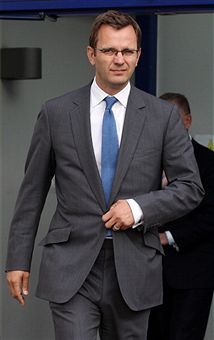 A recent turn in “Hackgate” has focused on the level of security clearance
given to Andy Coulson. The insinuation is that Number 10 knew that Coulson would not be able to pass the so-called Developed Vetting level (DV) and therefore gave him a lower level. I have no idea
what happened in No 10, or whether the allegations made against Coulson automatically disqualified him from obtaining DV level. But having been vetted several times, I can’t help but disagree
with the way the story has been covered by some organisations.
A recent turn in “Hackgate” has focused on the level of security clearance
given to Andy Coulson. The insinuation is that Number 10 knew that Coulson would not be able to pass the so-called Developed Vetting level (DV) and therefore gave him a lower level. I have no idea
what happened in No 10, or whether the allegations made against Coulson automatically disqualified him from obtaining DV level. But having been vetted several times, I can’t help but disagree
with the way the story has been covered by some organisations.
First, Coulson was, as far as I can gather, vetted to the Security Check (SC) level. That is not ‘the basic level of security vetting,’ as David Cameron and the Guardian have claimed. The basic level is called CTC or Counter Terrorist Check. When I asked somebody what it meant, I was told that you could be trusted not to blow yourself up at work. Kidding aside, there are levels even below this, such as EBS, or Enhanced Baseline Standard. To underline, then, Coulson’s vetting was not ‘basic’.
Typically, inquiries into personal circumstances, finances and lifestyles “will only be made as part of the DV or Security Check (SC) process”, to quote the Cabinet Office policy. So the idea that only under a DV process will investigators gather “details of psychological problems, alcohol and drug histories and mortgages, personal property, and debts” is false. Coulson’s SC status could therefore have come after a more thorough check. I don’t know if it did, but it could have done.
Finally there is what a person with SC clearance is allowed to see. Again, reports would have one believe that the SC level does not really give access to anything special. As The Guardian says, ‘Alastair Campbell and Lance Price, press advisers to Tony Blair, said they struggled to understand how Coulson could operate on issues. . . . with such low level clearance.’ But the answer is simple. Because Coulson would, in fact, be given sufficient access. To paraphrase government policy: SC clearance is for people who “have long-term, frequent and uncontrolled access to SECRET assets and/or occasional, supervised access to TOP SECRET assets.” In other words, someone with an SC clearance would see SECRET and TOP SECRET information, though in the case of the latter only in a supervised situation (i.e. with a colleague in the room).
For a press officer, even the most senior one, that level would be enough to follow issues ranging from the British economy, NATO policy, European security policy, Afghanistan and the terror threat to the UK. It may have been more convenient to have a DV clearance, but not at all impossible to work unimpeded without it.
None of this exonerates No 10 if the decision was made for reasons other than professional ones. But the way that the details of the story are being written up is misleading.






Comments